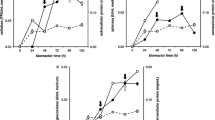Abstract
The biochemical mechanism for cellulose decomposition by a low molecular weight peptide, named short fiber generating factor (SFGF), derived from the culture supernatant of a cellulolytic fungus Trichoderma pseudokoningii S-38, was determined. Sufficient information obtained by biochemical and biophysical studies and combined with observation with a scanning electron microscope provided further evidence for the earlier studies that the SFGF had a high capacity for chelating and reducing ferric ions, and could produce free radical by reduction of Fe3+ to Fe2+ in the presence of oxygen molecule. These studies suggested that the effect of SFGF on cellulose is directly related to an oxidative reaction and is different from the hydrolysis of cellulose by cellulases. The alcoholic hydroxyl groups in cellulose can be oxidized by SFGF, which leads to destruction of the hydrogen bond network in cellulose and cleavage of glycosidic linkages. Both effects led to the de-polymerization of cellulose and the formation of short fibers, and increase of reducing groups in residual cellulose, then the cellulose substrates became more susceptible for hydrolysis by cellulases.
Similar content being viewed by others
Author information
Authors and Affiliations
Additional information
Received: 8 May 2002 / Accepted: 22 July 2002
Rights and permissions
About this article
Cite this article
Wang, W., Liu, J., Chen, G. et al. Function of a Low Molecular Weight Peptide from Trichoderma pseudokoningii S38 During Cellulose Biodegradation. Curr Microbiol 46, 0371–0379 (2003). https://doi.org/10.1007/s00284-002-3864-9
Issue Date:
DOI: https://doi.org/10.1007/s00284-002-3864-9




